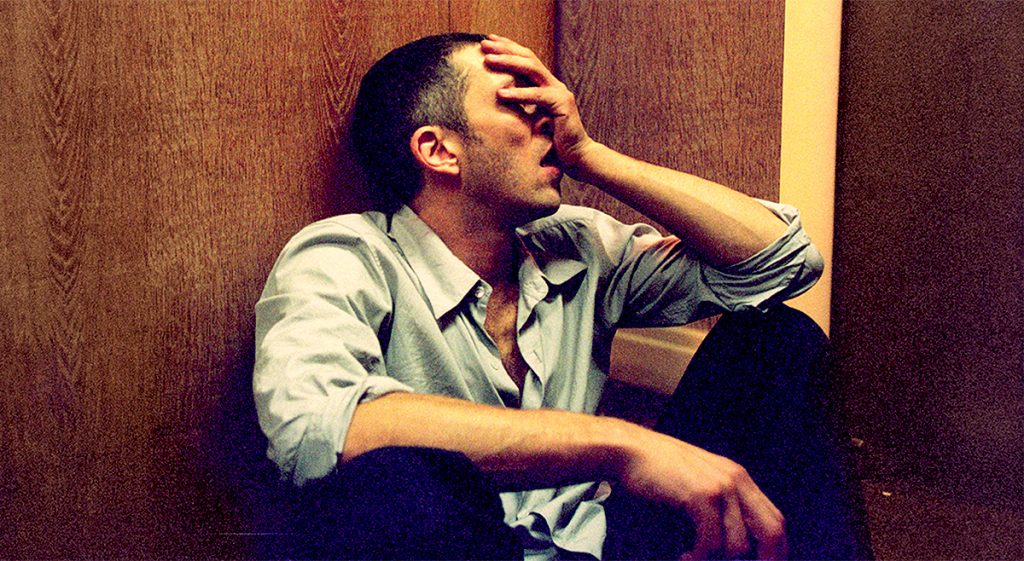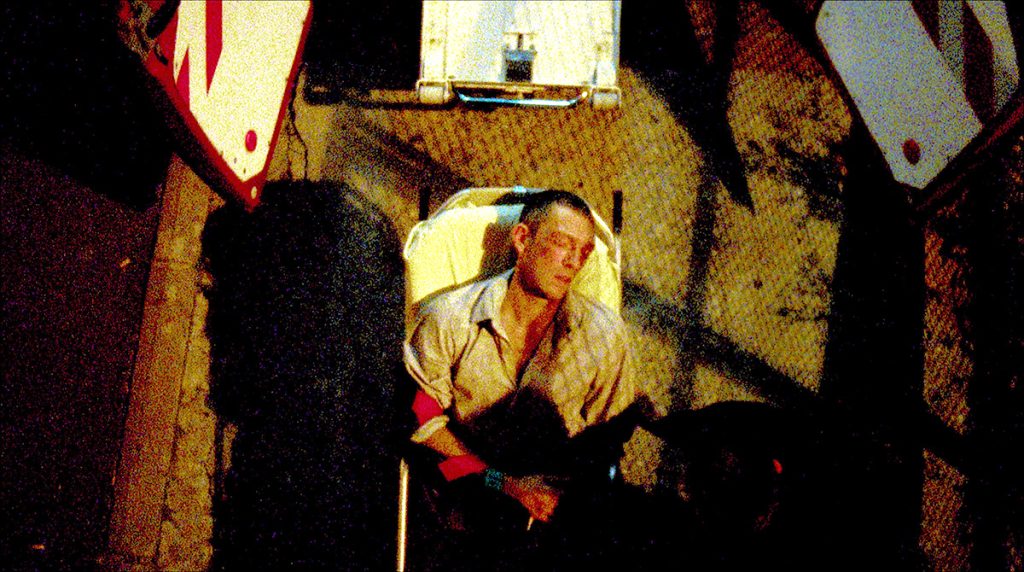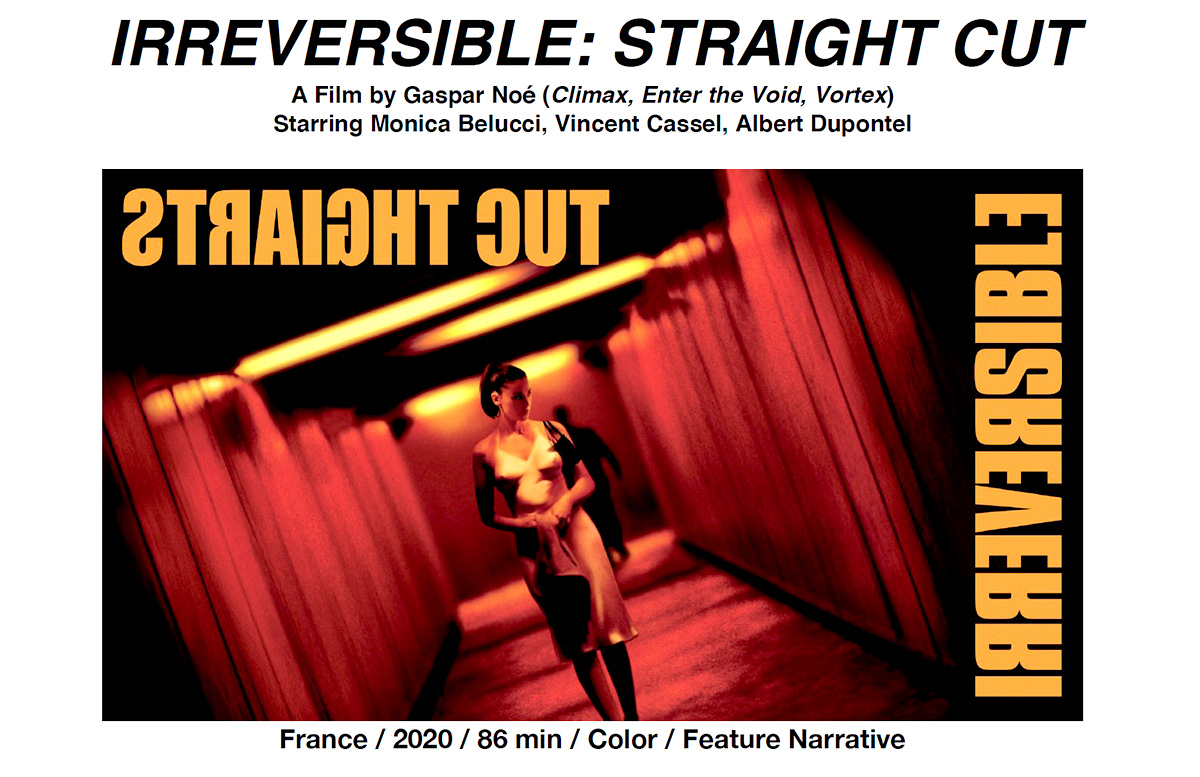IRREVERSIBLE, in the wake of its original 2002 release, was reviled in cinematic circles as a menace to society and possibly one of the most ghastly, if not the most ghastly made in recent memory. Yet, it was also revered in cinematic circles as a tour de force in moviemaking, though it appeared that acrimonious naysayers made the most noise. This reviewer wouldn’t be surprised if there were cinematic circles where the polarized sentiments still sizzle in these contemporary times.
Now available for the first time theatrically in the United States, according to the publicity stewards. Courtesy of Altered Innocence. IRREVERSIBLE: STRAIGHT CUT – along with a restored original cut in both digital and a new 35mm print format – provides an opportunity to see Director Gaspar Noé’s potent account of humanity at its worst from multiple perspectives, and the unshakable understanding that time, indeed, reveals all things. Not for the faint of heart, and can easily be regarded as offended; not recommended for photo sensitive people. This is Noé’s dark masterpiece, in ‘reverse’ and ‘re-reversed’ versions.
WORD readers should heed these words from the publicity folks – but should stare the double-daring caveats in the face and see ALL versions.
IRREVERSIBLE: STRAIGHT CUT (2022-2023) – A WORD Barebones Review
Vincent Cassell as Marcus
Albert Duponte as Pierre
Monica Bellucci as Alex
Jo Prestia as Le Tenia
Photographs by Emily De La Hosseray Courtesy of Altered Innocence
Opens with a striking drum percussive as garishly bold words and graphics flash on the screen. Segues after a several seconds to frenetic, staccato flickering then transitions to a twirling overview of children playing on a lush green lawn tapestry, eventually spinning to an intimate bedroom scene and accompanying pillow talk of lovers, Marcus played by Vincent Cassel, and Alex played by Monica Bellucci.
They have a kind of PG-rated ménage à trois with Pierre played by Albert Dupontel, Alex’s former lover. He is on the phone with them about their rendezvous to go to an evening party: “It’s Pierre. My car broke down, so, we’ll be taking the subway.”
Marcus and Alex pay little attention to the phone call and Alex recalls a dream of her being in a red tunnel which forks in two ways. What she describes sounds like an presage of things to come. She also says she is a few days late on her period. The lovers embrace. Cassel talks sarcastically about Pierre, saying he has to be nice to Pierre because he, Cassel, “stole” Alex from him and Alex protests that she is not an object to be stolen.
Cassel wants to have sex … Alex disproves as he roughhouses and pins her to the bed … she tells him she’s not ready for sex and if he hurts her, she will make him pay – dearly.
Later, the three are together in the apartment building elevator and make their way to the subway, and all along the way they chatter about sex and intimate details about the time when Alex and Pierre were together before she became involved with Marcus.
“I couldn’t give her a good fuck. I’m too cerebral,” Pierre laments lamely. And so on. And so forth. Ad absurdum.
At the party, there is a lot of flirting and several partygoers are cutting loose, not quite a bacchanal but revelry nonetheless, and Alex and Cassel eventually spat over the boorish and petulant way he’s acting and she decides to go home – alone. She eventually walks into an underpass to get to opposite side of a street with a lot of traffic and encounters Le Tenia played by Jo Prestia, who is abusing a transgender prostitute.
Alex freezes in horror. Le Tenia immediately targets Alex, savaging and anally raping her viciously before beating her into unconsciousness. It’s clear that he’s done something this before. The transgender prostitute flees for her life.
This reviewer was hooked! Hooked, that is, that he was quickly anticipating an equally vicious comeuppance for Le Tenia, say, his arms and legs being savagely ripped off for starters and whatever else the filmmaker(s) could imaginatively conjure up, like his tongue, perhaps, being ripped off and shoved into an orifice. A catharsis was needed for that scene of Alex being ravaged. ]Would the filmmaker(s) come through?
That’s what was cruising in my mind as I watched the horror show. The scene was not erotically arousing – though this reviewer can imagine that there might be members of an audience at home and, or, in theaters, who might get off on this.
On with the narrative: Marcus and Pierre inadvertently stumbled upon the scene of the crime. They had left the party after Alex left and were trying to hail a cab near the underground passageway that was the scene of the crime and are stopped by the police. Marcus sees Alex being loaded into an ambulance.

Marcus played by Vincent Cassell: Shocked that Alex was attacked. Picture by Emily De La Hosseray. Courtesy of Altered Innocence
They are questioned by police and then are eventually approached by two men who insist Marcus and Pierre must take revenge. They help Marcus and Pierre get the name “La Tenia” from the prostitute who had been attacked by La Tenia. Marcus and Pierre shift into revenge mode with Marcus seething more than Pierre. Mission creep sets in, opening up possibilities for human bestiality rooted in undeniable self-righteousness, narcissism and sadism – like the way lynch mobs and pogroms and mobs bent on what they may said is vigilante justice do but it becomes so much more.
This reviewer, who has seen both the chronological and non-chronological versions, is writing this overview of the plot and story based on the linear sequence of events. In the course of the film, the two out for revenge trying to hunt down the rapist, show up at a gay nightclub, the Rectum. Marcus (again, played by Vincent Cassell) gets into a fight with whom he believes is the suspected rapist who ends up breaking Marcus’ arm and then tries to rape him.

Marcus played by Vincent Cassell: Started a fight he couldn’t finish. Picture by Emily De La Hosseray. Courtesy of Altered Innocence
Pierre attacks the suspected rapist and, wielding a fire extinguisher, smashes him in his face again and again and again. The smashing of the face is ungodly. And so on. And so forth.
Note: A version of the film told in chronological order, Irreversible: Straight Cut (French: Irréversible – Inversion intégrale), screened at the 2019 Venice International Film Festival. It was released in Los Angeles and New York City on 10 February 2023. A schedule of screenings is lower in this article.
The Legion of Decency was originally baptized in 1933 and reorganized in 1965 as the National Catholic Office for Motion Pictures (NCOMP) for rating films for Catholics. A, B, or C for condemned. The C rating ended in 1978.
I vaguely recall a Sister Mary Holy Water suggesting in a grade school catechism class on Chicago’s North Side way back when that I and my classmates could end up in hell if we collected too many C-s. My friends attending public schools were doomed nonetheless, she intimated. I’d seen enough C flicks to send me to Hades but of course, even back then, I recognized the folly. I bring up the Legion of Decency to point out that revenge seems pretty much written into our genetic code as well as censorships being imposed on us.
An Aside
Director Sam Peckinpaw, one of the best of the best as far as this reviewer is concerned, eroticized his STRAWDOGS (1971) gang-rape scene(s) of Actress Susan George’s Amy. The fastidiously crafted cinematic prurience made it appear that Amy wanted it, was in to it, that she was willing to bask in the violations of her orifice of her attackers’ choosing.
Peckingpaw did it with an explicit sequence of one of the rapes, plus shots alluding to that rapist’s buddies off-camera ravaging Amy played by Susan George. It was mesmerizing as well as revolting and disturbingly visceral – a repulsive Peckinpaw movie that I would only see once. Usually, I see the good, the bad and awful more than once at least. The good, of course, many times; the bad maybe a few times and the awful once or twice though I might not watch the whole thing.
STRAWDOGS (1971) was released two years after Peckinpaw’s celebrated THE WILD BUNCH (1969) – I revisit it on occasion – with its orgiastic slow motion slaughtering. I gorged on it and can imagine possibly tapping into bloody resonances of the Viet Nam War, Civil Rights Movement and Urban Uprisings of the ’60s. Director Sam Peckinpaw was one of the best of the best as I said earlier, though he had bloopers as mighty as his reputation for exquisitely gut wrenching violence. HIs eroticized STRAWDOGS (1971) gang-rape of Amy played by Susan George’s was unadulterated schlock.
Besides the schlock, STRAWDOGS flopped because the story really was about May’s husband, played by Dustin Hoffman, tapping into his mojo to enhance his manhood.
Irreversible (France, 2002)
Director: Gaspar Noé
Cast: Vincent Cassel, Albert Dupontel, Monica Bellucci, Jo Prestia
Screenplay: Gaspar Noé
Cinematography: Benoît Debie, Gaspar Noé
Music: Thomas Bangalter
U.S. Distributor: Lionsgate
Remaining Dates
2/24 – 3/2 Central Cinema (Knoxville, TN)
3/10 – Cleveland Cinematheque (Cleveland, OH),
More Cities To Be Announced
Production Notes: STRAIGHT CUT
This reconfigured vision – IRREVERSIBLE STRAIT CUT – allows audiences to see the events of the film unfold in the order in which they occur, providing new context for pivotal scenes of brutality and the subsequent quest for revenge. Now available for the first time theatrically in the U.S., courtesy of Altered Innocence, IRREVERSIBLE: STRAIGHT CUT – along with a restored original cut in both digital and a new 35mm print format – provides an opportunity to see Director Gaspar Noé’s potent account of humanity at its worst from multiple perspectives, and the unshakable understanding that time, indeed, reveals all things.

Alex played by Monica Belli. Posed shot, not from a scene. Picture by Emily De La Hosseray. Courtesy of Altered Innocence
Putting the scenes in clockwise order makes it easier to identify with the characters and understand the tale unfolding. The same story is no longer a tragedy, this time it is a drama that brings out the psychology of the characters and the mechanisms that lead some of them to a murderous barbarity. While IRREVERSIBLE has sometimes been wrongly perceived as a “rape and revenge” B movie, here the deadly outcome is all the more depressing. The film can be more easily seen as a fable on the contagion of barbarity and the command of the reptilian brain over the rational mind.
Removing the anti-clockwise structure, a mentally invasive formal concept, brings out the actors’ performances that much more forcefully. The gentleness or violence of the situations and the emotional states of the characters become even more apparent.
In his director’s statement for the festival, Noé wrote: “Why this film? Because the original was told backwards and many viewers, swamped by the anti-clockwise structure of the editing, didn’t understand certain aspects of the story. Presented clockwise, everything is clear, and also darker. No dialogues have been cut, nor have any events in the story. Which is why this version is called STRAIGHT CUT.”
“Until now, IRREVERSIBLE was a deliberate puzzle. Now, it’s a diptych, like an old record whose B-side is the less conceptual mix of the track on side A, but this time with voices that are more audible, rendering the meanings of the words more fatalistic. You will see. Time reveals all things.”
The STRAIGHT CUT came about as Noé worked on a new master of the film, and, owing to popular demand, opted to ‘re-reverse’ the story while he was at it. It had originally been designed to be an extra on a Blu-ray release of the film, yet Noé decided it worked so well it warranted its own release. While the original version ‘remains both the director’s cut and the real version of the film’, he clarified, the new cut was ‘another film’ entirely, and – as stated in an interview at the Venice Film Festival – ‘stronger,’ he felt.
He elaborated further on the STRAIGHT CUT: “Putting the scenes in clockwise order makes it easier to identify with the characters and understand the tale unfolding. The same story is no longer a tragedy, this time it is a drama that brings out the psychology of the characters and the mechanisms that lead some of them to a murderous barbarity. […]”
“While Irreversible has sometimes been wrongly perceived as a ‘rape and revenge’ B movie, here the deadly outcome is all the more depressing. The film can be more easily seen as a fable on the contagion of barbarity and the command of the reptilian brain over the rational mind. [..] Removing the anti-clockwise structure, a mentally invasive formal concept, brings out the actors’ performances that much more forcefully. The gentleness or violence of the situations and the emotional states of the characters become even more apparent.”
“On the original release of IRREVERSIBLE, critics responded vehemently, and the relationship between the violence of the film and its form was central to how it was perceived and valued. However, as yet, there has been little critical response to the Straight Cut and, as a result, there has been little discussion about how the revised structure impacts on the film’s meaning and the permissibility of its depiction of violence.”
There was quite the uproar at the 2022 Cannes but, nevertheless, besides being nominated for Palme d’Or, 2002, it won Bronze Horse, Stockholm Film Festival, 2002; Runner-up, Boston Society of Film Critics Awards, 2003; Best Cinematography, Best Foreign Language Film; won Best Foreign Language Film, San Diego Film Critics Society Awards, 2003; nominated for Best Foreign Language Film, Film Critics of Australia, 2004.
For this reviewer, it was a tour de force in moviemaking – I’m talking about both versions – and there is no denying that it is viscerally grueling and emotionally and intellectually disturbing – and that even now it’s most certainly able to incense some folks even in these contemporary times.
Roger Ebert, when he was alive, was quoted as saying it’s “so violent and cruel that most people will find it unwatchable.” This writer was unable to find a renowned film critic effusively praising it but assumes such effusive praises were, and are, out there, nonetheless. I did a thorough search and came up with nothing.
I wonder what respected filmmakers in these contemporary times would be saying now. Consider the racial divide and polarization in this country, I wonder how respected filmmakers of Color as well as respected film reviewers of Color would say. Last, but absolutely not least, I wonder what’s on the mind of respected women filmmakers and film reviewers.
The original story was told in an unchronological manner. That is, it starts at the end and ends at its beginning. In 2019, Director Noé released a version that ran chronologically. IRREVERSIBLE: STRAIGHT CUT, the radically revised director’s re-cut, opened theatrically in The Big Apple, Los Angeles and select cities February 10. IRREVERSIBLE: STRAIGHT CUT is, according to Matthew Johnstone Publicity, a ‘director’s re-cut’ not a ‘director’s cut’.
Gregg W. Morris can be reached at gregghc@comcast.net, profgreggwmorris@gmail.com
